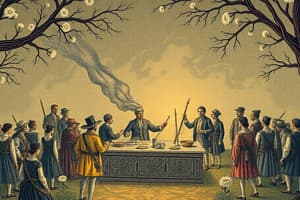Podcast
Questions and Answers
The Hartford Convention was held in ______, Connecticut.
The Hartford Convention was held in ______, Connecticut.
Hartford
The convention took place from December 15, 1814, to January 5, ______.
The convention took place from December 15, 1814, to January 5, ______.
1815
Delegates from Massachusetts, Connecticut, Rhode Island, New Hampshire, and ______ met at the convention.
Delegates from Massachusetts, Connecticut, Rhode Island, New Hampshire, and ______ met at the convention.
Vermont
The primary concerns of the delegates revolved around trade and the ______.
The primary concerns of the delegates revolved around trade and the ______.
The Federalists sought to address their concerns through amendments to the ______.
The Federalists sought to address their concerns through amendments to the ______.
Delegates called for a two-thirds majority vote in Congress for declarations of ______.
Delegates called for a two-thirds majority vote in Congress for declarations of ______.
The convention's proceedings were leaked to the public during the War of ______.
The convention's proceedings were leaked to the public during the War of ______.
The perceived disloyalty of the delegates during a time of ______ damaged the Federalist Party's reputation.
The perceived disloyalty of the delegates during a time of ______ damaged the Federalist Party's reputation.
The Hartford Convention ultimately marked a significant turning point for the ______ Party.
The Hartford Convention ultimately marked a significant turning point for the ______ Party.
The successful conclusion of the War of 1812 overshadowed the convention's perceived efforts to undermine the ______ government.
The successful conclusion of the War of 1812 overshadowed the convention's perceived efforts to undermine the ______ government.
Flashcards
Hartford Convention
Hartford Convention
A series of secret meetings held in Hartford, Connecticut, in 1814 by New England Federalists to address grievances with the War of 1812 and the federal government.
Federalist Party
Federalist Party
A political party in the early United States that favored a strong central government and close ties with Great Britain.
War of 1812
War of 1812
A war fought between the United States and Great Britain from 1812 to 1815.
Sectionalism
Sectionalism
Signup and view all the flashcards
Grievances of the New England Federalists
Grievances of the New England Federalists
Signup and view all the flashcards
Amendments Proposed at the Hartford Convention
Amendments Proposed at the Hartford Convention
Signup and view all the flashcards
Impact of the Hartford Convention
Impact of the Hartford Convention
Signup and view all the flashcards
Decline of the Federalist Party
Decline of the Federalist Party
Signup and view all the flashcards
Turning Point for the Federalist Party
Turning Point for the Federalist Party
Signup and view all the flashcards
Legacy of the Hartford Convention
Legacy of the Hartford Convention
Signup and view all the flashcards
Study Notes
Background
- The Hartford Convention was a series of secret meetings held in Hartford, Connecticut, from December 15, 1814, to January 5, 1815, by New England Federalists.
- New England Federalists, largely merchants and businessmen, felt increasingly disconnected from the rest of the nation due to economic hardship and differing viewpoints on the War of 1812.
- Rising sectionalism existed between the New England states and the other parts of the country, notably over trade and the War of 1812.
Issues Addressed at the Convention
- Delegates from Massachusetts, Connecticut, Rhode Island, New Hampshire, and Vermont met to discuss their grievances against the ongoing War of 1812.
- The primary concerns revolved around the perceived inadequacies of the federal government, particularly regarding issues such as trade and the military.
- The Federalists sought to address their concerns through amendments to the Constitution to secure their regional interests, showing a push for greater state power.
Key Demands of the Delegates
- Amendments to the Constitution that would bolster federalist power were urged as a response to the perceived inadequacies of the national government.
- Delegates called for a two-thirds majority vote in Congress for declarations of war and for the admission of new states.
- They proposed amendments to alter the ratio of representation in Congress to decrease the power of the South and West.
- Financial support for states suffering from British attacks also featured in the discussion, but this was not a formal proposal.
Significance and Impact
- The proposed amendments were meant to give New England states greater power in the national government, reflecting a desire for regional influence.
- The convention's proceedings were leaked to the public near the end of the War of 1812.
- This timing, coupled with the war's end, played a significant role in the Federalist Party's demise.
- News of the peace treaty and American victory overshadowed the convention's perceived efforts to undermine the national government.
- The perceived disloyalty of the delegates during a time of war damaged the Federalist Party's reputation considerably.
Aftermath and Legacy
- The Hartford Convention ultimately marked a significant turning point for the Federalist Party.
- The convention's image as an act of disloyalty, coupled with the war's successful conclusion, severely damaged the party's standing and led to their eventual decline in prominence.
- The convention's reputation as an effort to undermine national unity and, in some eyes, to possibly even consider secession ultimately contributed to its negative connotation in American history.
Overall Impact on US Politics
- The Hartford Convention left a lasting mark on American politics, highlighting the deep divisions within the nation.
- The mistrust and division between the factions within the country were deeply entrenched.
- The convention highlighted the tension over state versus federal power and the complex issue of sectionalism.
- The convention exposed deep fissures between regions and political alignments, highlighting the sensitivities of states' rights and national unity, issues that remain relevant today.
Studying That Suits You
Use AI to generate personalized quizzes and flashcards to suit your learning preferences.


